How Did Radio Change From Then To Now
How Many Languages Can One Person Speak?
Did you know there'south no Guinness Globe Record holder for "well-nigh number of languages spoken"?
Why this omission? The answer lies in the curious story of a Liberian-born linguistic communication teacher, Zlad Youssef Fazah, and a Chilean TV conversation show, Viva el lunes.
In 1973, Fazah was living in Brazil, which at the time was under a armed forces dictatorship. Soldiers knocked on his door and demanded that he get with them.
"I felt sick with fear," Fazah later recalled. "I idea I was being arrested as a spy."
Fazah was interrogated for existence a spy, fifty-fifty though he was just a humble language teacher. The soldiers had picked him upward on the orders of the CIA. His interrogators wanted to know why a immature homo from the Middle East spoke Chinese and Russian. They asked: Who was he working for? Was he a Russian spy?
"I wasn't working for anyone, non in their sense," Fazah says. "I was but really skilful at languages."
"My language skills accept non ever brought good things," he adds.
Until 1998, Fazah held the Guinness World Record for speaking 58 languages. That was until he appeared on Viva el lunes.
On the dark of the show, the host surprises Fazah with a language test, with audience members (diplomats brought in from different embassies) request him questions in various languages. When it comes to the questions in Finnish, Russian and Mandarin, Fazah looks visibly anxious. He asks that the questions be repeated more slowly. So he asks that they exist repeated again. With some questions, he stutters an respond. With others, he fails to answer at all. By the end of the bear witness, the audition start to boo him.
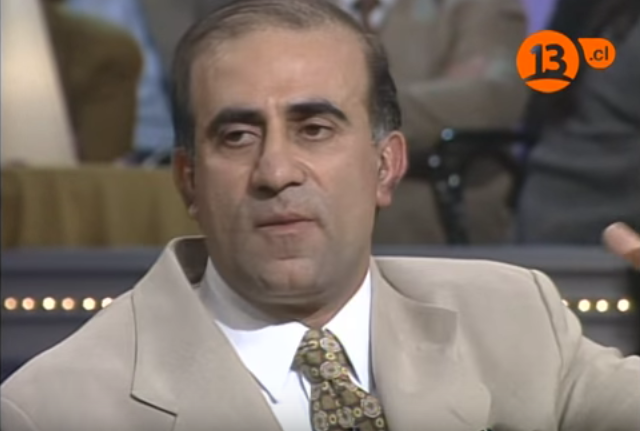
Thank you to YouTube, you can watch the full catastrophe unfold.
Nowadays, the Guinness Book of Globe Records no longer awards a place to the person who can speak the most languages. This is likely due to general confusion on the definition of fluency – and how difficult it is to exam the claims of polyglots.
A few years agone, polyglot blogger Ryan Boothe gave Fazah the right of respond to his advent on Viva el lunes. Subsequently a phone interview with Fazah, Boothe wrote:
Before [Fazah] went on that Chilean program the producers had told him that he would simply be interviewed and non tested. He went to the studio finding that they had brought diplomats from many different countries that were going to exam him in their native languages. A lack of preparation, nerves and jetlag got the better of Ziad and he responded incorrectly to a few of their questions. To this mean solar day he wishes he would have walked off the set instead of going on alive Idiot box..
Further:
The video on YouTube was edited to only show the wrong responses and non the many correct responses that [Fazah] gave.
The controversy surrounding Fazah begs the question: How many languages is it possible for one person to speak?
Who Holds the Tape For the Most Languages Spoken?
In that location are plenty of examples of people through history who accept claimed to have held command over a staggering amount of languages.
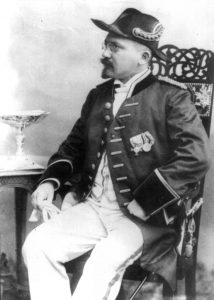
German diplomat Emil Krebs (1867-1930) made it his life's quest to larn every language in the globe. He reportedly spoke 65 languages and had a special and rather unique interest in translating the phrase "kiss my ass", which he managed to do in 40 languages. His brain was examined past German neuroscientists in 2002, who reported it was unlike to other brains.
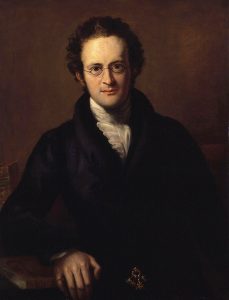
Sir John Bowring (1792-1872), the 4th Governor of Hong Kong was allegedly able to speak in over 100 languages. However, there exists no determinable proof of this claim, autonomously from reports from those who knew him that he held a lifelong passion for the written report of language.
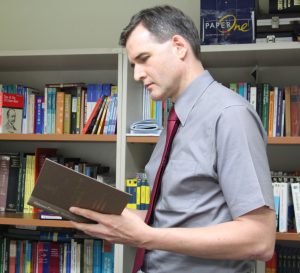
The nearly impressive living example of a hyperpolyglot is probably Alexander Arguelles, who has studied and to some degree understands effectually 50 languages. Alexander caught the language bug at academy when he began studying German. From then on, he devoted himself to learning as many languages every bit he could in his lifetime. He notes that the further he goes with his learning, the easier languages come to him. When he showtime started learning Swedish he was able to hold a complex chat inside 3 weeks. Yet, he considers this an early stage of learning a language, with much work left to become.
" Climbing the mountain – achieving native fluency – is always going to have years." – Alexander Arguelles
What Does information technology Mean to Be Fluent?
At which stage of language learning tin can we consider a person to exist fluent? Is information technology when they can competently agree a conversation, or not until they tin can converse in far more complicated topics? Do we need tangible proof for each language these individual's claim to speak, such every bit a CEFRL diploma?
I believe the thought of fluency comes downward to the private. For me, it was existence able to speak confidently, with few hesitations or mistakes – aiming for near a 90-95% level of "perfection", and for use specifically in common social situations. This "upper intermediate" level of B2 on the CEFR scale, is what near people think of when they imagine using their language – it'south finersocial equivalencyto your native language, with allowance for an accent and a few pocket-size slips.
What you lot can do at the C levels is more for professional situations, and while I've achieved this myself in some languages enough to work as an engineer or translator, this is actually overkill for the vast majority of people, who desire to alive their normal (non-technical) lives through the language. The way we use the linguistic communication the majority of our time interacting with people is fluency to me, and anything across that is "mastery".
While having a C2 diploma in Spanish is neat, I honestly oasis't usedmasterylevel Castilian much since I stopped working in technology and translation, simply I continue to usefluentlevel Spanish regularly in social settings. The same goes for my C2 French, and my C1 German.
The fashion I've worked towards fluency has involved putting down the textbooks and learning to speak from 24-hour interval one until I achieve upper-beginner (A2) to lower-intermediate (B1), and and so to hit the books and get more than formal lessons, to "tidy up" what I have until I take a more solid command of the language. It'southward a method I've used for every unmarried language I've learned and the one I credit the nigh to my success.
How many languages?
Using this approach I can personally speak in7languages at a fluent level (as I've described in a higher place) or higher. I tin can besides get by pretty well in a bunch more, but when asked "How many languages exercise you lot speak?" (and I get asked that a lot!!), I never give a simple number, since it's not a simple question 🙂
My answer isalwaysthat it depends on how you lot define "speak", then I give a quick definition of my agreement of fluency and say that based on that I speak 7 languages, but I can go by in a bunch more.
Zlad'south unfortunate experience is always in the dorsum of my mind whenever I'chiliad beingness interviewed on Idiot box or radio, which is why I endeavor to spotter my words whenever possible. I would most ever insist on being interviewed in merely i language (and am happy to do that in non-English languages, as I was in Spanish and Irish and a few other languages on the radio), since that is the only useful language for anyone listening.
It's non really a question that does well either way on media.
Get-go, it's likewise easy to exaggerate your skills in a short spot and make people recollect you tin do what you lot truly tin can't. I've never felt embarrassed or booed off stage, but I did really feel genuinely terrible subsequently one interview when the management information technology went in was such that I said a random phrase in Quechua that I still remembered. I realized too late that nosotros had gone in a direction such that the decision of the interview was "yous're a very impressive man, Benny Lewis!"
I hated it – I had wanted to make an impression on inspiring some listeners to swoop into their own linguistic communication projects, that it's easier than they recall, and that they aren't besides old, and instead I had just been a easily forgotten picayune spot between aqueduct hopping. This to me is genuinely the worst interview I've ever washed and to this day I still experience guilty almost it.
CEFRL certificates are probably the best fashion to "testify" that you speak a linguistic communication, only it doesn't make for good Idiot box or radio to follow along with someone in silence (autonomously from the listening comprehension and oral exam) for 3+ hours, then wait ii months until a certificate comes in the post 🙂 I can't encounter that ever working on prime time TV…
But then information technology'south too bad the other way, and someone who genuinelycanspeak multiple languages could get totally embarrassed, every bit we've seen.
How would I practice in a live test?
The worst that's happened to me then far is that I've been put on the spot to translate random words on live radio. I actually have Zlad to thank for his "worst instance scenario" experience beingness in the back of my mind, and to downplay my skills whenever possible and have a style more useful goal on media. A TV show may invite me to entertain their audience and boost their ratings, but I don't intendance virtually that. For me it'south a platform to inspire new learners, not to impress people flicking between stations, who'll forget it in v minutes.
Luckily, thanks to plenty of experience at present, I am very confident in interviews and can modify the management it's going in, even though I'm the interviewee. When I got asked once to interpret "caterpillar" into all my languages (seriously?), I said quite honestly that I'm here to inspire beginners to consider learning a language themselves, not to endeavor to impress people.Rather than play along, I told them honestly that I would fail that test miserably, since I'yard non a walking dictionary and blurting out random words in completely different languages is not a skill I possess.
To avoid any clumsiness, I rapidly inverse direction and gave a tip for how anyone listeningcouldlearn strange words similar caterpillar, citingoruga as an instance in Spanish, and gave a quick mnemonic suggestion. From here I could segway into my best encouragement for people who may think they have a bad memory, or are also old.
Inspiring learners was why I was on the air afterward all, and with ordinarily just iii minutes to do it, I stop silly questions in their tracks and plough them into opportunities to be usefulto anyone listening 😉
However, there are many other individuals who employ the use of other methods with inspiring results, in the linguistic communication learning world.
Permit'south take a look at a collection of polyglots from effectually the globe – their stories, what inspired them to take up language learning and what you can larn from them.
Richard Simcott: The Multilingual Ambassador with a Language Addiction
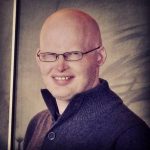
"Language carries the culture of the country that uses it and when you internalise it, it becomes a role of yous too." – Richard Simcott
Richard Simcott'south fascination with languages started as a child. At school he began studying languages and in that location started an addiction that he knows will continue on for the rest of his life.
Richard has studied more than 40 languages over the years and can speak in over 16 (English language, French, German language, Spanish, Italian, Portuguese, Polish, Latvian, Russian, Macedonian, Norwegian, Swedish, Chinese and Ladino, to proper name a few!). His love of learning languages has led him to be named the 'Multilingual Ambassador' for the Goethe Institut, every bit well every bit founding the Polyglot Conference. He is also raising his daughter to be multilingual – regularly speaking to her in English, French, German and Spanish.
Richard makes a point to study languages every solar day, anywhere from a unmarried hour, up to viii. He besides likes to visit a state with native speakers of whichever language he may be learning at the time, as he believes immersion is a key factor in making things stick.
Richard notes that his greatest struggle with language learning is time. Along with juggling his 24-hour interval to solar day responsibilities of parenthood, work and university study, he feels in that location never will exist enough time to learn all he wants in life, but he will continue on with his language learning until his body tin no longer take it.
Susanna Zaraysky: "Linguistic communication is Like Music"

"For me, the fundamental to learning is being able to heed – paying attention to patterns, the fluctuations of speech and the emphasis in the words. I listen to strange languages equally though they are songs – and that's how I remember words and the melody of spoken language." – Susanna Zaraysky
Susanna Zaraysky began learning languages from an early historic period. Her family left the Soviet Union when she was three, immigrating to the United States, where she was forced to learn English apace. She went on to study 9 other languages (French, Spanish, Italian, Portuguese, Serbo-Croation, Ladino, Hebrew, Standard arabic and Hungarian) and has travelled to over 50 countries.
She notes that while vocabulary and grammer are essential factors to language learning, information technology is important to supplement your studies with accompanying resources that make learning fun. She believes using Tv set, radio, music and film as additions to your language lessons reinforces the basic cornerstones of what you are already having to learn.
Susanna in particular cites music as being a central role of her language learning, saying it'southward the perfect mode to improve your accent, pronunciation, timing and grammar. In a higher place all, she believes that the most important role of learning language is how information technology makes you feel. She states that she has a unlike way of expressing herself, depending on which of her languages she is speaking, a side effect of beingness a polyglot that enriches her life.
Alex Rawlings: Uk's Most Multilingual Student

"Languages are an nugget for whatsoever you want to practise in life. They open your heed to worlds you never knew were there. They introduce y'all to amazing people that you might otherwise take but walked by." – Alex Rawlings
In 2012, a contest was held across the Great britain to find Uk's most multilingual educatee. Alex Rawlings, historic period xx, tested for fluency in xi different languages (English, Greek, German, Danish, Russian, Hebrew, Catalan, Italian, French, Afrikaans and Castilian), before taking out the coveted title.
Since graduating from Oxford, he has been leading the nomadic lifestyle (much like myself), travelling and living across Europe equally he adds more languages to his arsenal, such as Hungarian and Serbian. He now teaches languages and both attends and runs polyglot events.
Alex has succeeded in learning languages largely because he discovered a way that worked for him. He notes that most people who written report languages in an academic setting don't actually learn them – they are taught them. Once y'all've finished the subject pass or fail, you lot'll probably forget whatever it was yous've learned for the residual of your life.
To gain any kind of success in learning languages, Alex had to find a fashion that worked for him. Immersion has been a fundamental factor in his success. His first language was Greek, which he began learning due to his heritage – growing upwards with a Greek mother. As a corking traveller, he's happily travelled to and spent fourth dimension in countries, which have languages of interest to him.
Now that he has figured out a way of linguistic communication learning that suits him, he is able to apply this method to go on to become fluent in others, equally he proved when he moved to Budapest to learn Hungarian.
I onced asked Alex how he manages to compartmentalise his languages, to not mix them up when speaking and proceed them fresh in his memory. He said that as he is a visual person, he pictures his languages as having something to practice with weather – Russian in his head is cold and Spanish makes him think of the beach. Focusing on these images helps him stick to whichever language he is speaking at the time.
Luca Lampariello: Languages Cannot Be Taught – They Can Only Be Learned
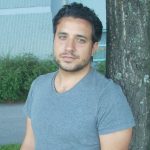
"I'm constantly exploring in the languages I've learned through the written give-and-take, and this exploration helps me to connect the dots." – Lucas Lampariello
Italy is a country that is infamous for being monolingual – even so Luca Lampariello has managed to reach a high level in 10 languages (Italian, English language, French, High german, Spanish, Swedish, Russian, Dutch, Portuguese and Mandarin Chinese), studying many of them while living in his home country.
His breakthrough in language learning came at the historic period of 10, when his mother hired an American tutor who guided him through the English language, rather than just instruction it. He constitute that he had the greatest success through reading and being OK with making mistakes – taking up the ultimate challenge of completing Steven King'southward novel "It" in English, despite his learning level at the time (and age!).
He constitute that although reading helped build his vocabulary, information technology went a step further in helping his comprehension by putting words information technology into context.
From all the polyglots mentioned above, 1 thing becomes abundantly clear. Each individual, through trial and error, found a method of language learning that worked for them. They then continued to utilize this method over again and once more as they went on to larn multiple languages.
If you want to be successful in language learning, you will need to practice the same.
Experiment. Don't be scared to try new approaches, if you find others don't work too for y'all. Yous'll shortly observe the mode that works best. And from in that location… who knows how many languages you could learn? The sky's the limit.
Source: https://www.fluentin3months.com/how-many-languages/
Posted by: tomlinsonpards1941.blogspot.com


0 Response to "How Did Radio Change From Then To Now"
Post a Comment